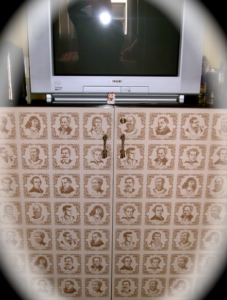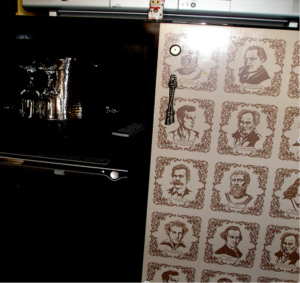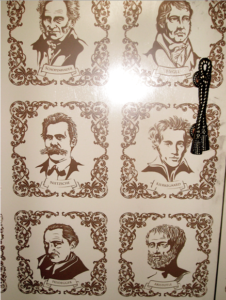Congratulations to reader Kari Diehl, who took third place in the Pacific Northwest Writers’ Association’s literary contest’s romance genre division! Well done, Kari!
That’s the second placer amongst the 8 blog readers that I now know were nominated (reader Amy Fisher won the memoir/NF book category, as I announced over the weekend. Wahoo!), but as I did not go to the ceremony and the results are not yet posted online, I do not know how the rest did.
But please join me in a big round of applause to everyone who was nominated, and I’ll keep reporting good news as it rolls in. Or not, as the case may be. But I’m proud of all the finalists, and everyone who was brave enough to enter.
Okay, back to serious business:
I feel as though I have been engaging in hypnosis for the last couple of weeks: you are relaxing, I tell you, RELAXING in the face of your upcoming pitching appointment… your only goal is to get these people to ask to see your work… you are buttonholing agents in at conference events and successfully giving your hallway pitch… you are calmly going through your 2-minute pitch to an agent who is delighted to hear it… your only goal is to get these people to ask to see your work, and you are thrilled when they do…
And you will read Sinclair Lewis (whose picture that is, incidentally: I love the intensity of those early 20th-century author photos; they always look as if they’re about to take a big bite out of the photographer)… and not think his work is dated… not dated, I tell you…
So let’s assume for the moment that the mantras I’ve been chanting at you for all these weeks have worked, and an agent or editor has asked to see the first chapter, the first 50 pages, or even the entirety of your manuscript. What do you do next?
In the first place, you send your submissions simultaneously to everyone who asked for them, for reasons I explained on Saturday. Your heart may tell you to give that dreamy agent who was so nice to you an unrequested exclusive, but believe me, your brain should be telling you to play the field.
Don’t tell me that love is blind. Follow Sinclair’s example and wear your glasses, for heaven’s sake.
Second, you send precisely what each agent asked you to send. No slipping in an extra five pages because there’s nifty writing in it, no adding a videotape of you accepting the Congressional Medal of Honor, no cookies or crisp $20 bills as bribes.
Need I say that I know writers who have done all these things, and now know better?
The first 50 means just that: the first 50 pages in standard format, even if that means stopping the submission in mid-sentence. (And if you aren’t absolutely positive that your manuscript IS in standard format or if you were not aware that manuscripts are NOT formatted like published books, please run, do not walk, to the FORMATTING MANUSCRIPTS category at right.)
If you’re asked for a specific number of pages, don’t count the title page as one of them — but no matter how long an excerpt you have been asked to send, include a title page. (If you don’t know how to format a professional title page, or even that there is a professional format for one, please wend your way to the YOUR TITLE PAGE category at right. You see, I really have been preparing my readers for this moment.)
Under no circumstances should you round up or down, even if pp. 49 or 51 is the last of the chapter: part of the point of this exercise is to show that you can follow directions, a rather desirable attribute in a potential client who might be expected to meet sudden deadlines or make surprise revisions down the line.
If asked for a synopsis, send one; do not enclose one otherwise. Ditto for an author bio (don’t worry; I’ll be talking about how to build one next week), table of contents (unless you’ve been asked to submit a book proposal), illustrations, letters of recommendation from your favorite writing teacher, and the aforementioned cookies.
Just send what you’ve been asked to send: no more, no less. With two exceptions: first, you should include a SASE. industry-speak for a stamped (not metered), self-addressed envelope for the manuscript’s safe return. Second, you should include a cover letter.
Why the cover letter? Well, in the first place, render it as easy as humanly possible to contact you — the last thing you want is to make it hard for them to ask for more pages, right? But also, you should do it for the same good, practical reason that I’m going to advise you to write
(Conference name) — REQUESTED MATERIALS
in 3-inch letters on the outside of the envelope: so your work doesn’t end up languishing in the slush pile of unsolicited manuscripts (which are, incidentally, almost invariably rejected). Agents and editors hear a LOT of pitches in the course of the average conference; no matter how terrific your book is, it’s just not reasonable to expect them to remember yours weeks after the fact (which it almost certainly will be, by the time they get around to reading it) simply by its title and your name.
Thus, it is in your best interests to remind them that they did, indeed, ask to see your manuscript.
Be subtle about the reminder — no need to state outright that you are worried that they’ve confused you with the other 150 people they met that day — but it is a good idea to provide some context. Simply inform the agent or editor him/her where you met and that s/he asked to see what you’re sending. As in,
Dear Mr. White,
I very much enjoyed our meeting at the recent Conference X. Thank you for requesting my fantasy novel, WHAT I DID TO SAVE THE PLANET.
I enclose a SASE for your convenience, and look forward to hearing from you soon. I may be reached at the address and phone number below, or via email at…
Regards,
A. Writer
That’s it. No need to recap your plot or re-pitch your concept. Just simple, clean, businesslike. (But NOT, I beg you, in block-indented business format; many folks in the industry regard business format as only marginally literate, at best. I don’t care what you do in the multi-million dollar factory you run: indent those paragraphs whenever you are dealing with anyone in publishing.)
Oh, and if other agents or editors requested it, say so. Considered good manners, and often gets your submission read a bit faster.
The other reason that mentioning where you met is a good idea is — and I tremble to tell you this, but it does happen — there are some unscrupulous souls who, aware that pitch fatigue may well cause memory blurring, send submissions that they CLAIM are requested, but in fact were not.
“Oh, like he’s going to remember ANY pitcher’s name,” these ruthless climbers scoff, stuffing first chapters into the envelopes of everyone who attended a particular conference.
Such scoffers occasionally receive a comeuppance redolent with poetic justice: VERY frequently, the roster of agents and editors scheduled to attend a particular conference changes at the last minute. How well received do you think a, “I enjoyed our conversation at last weekend’s Conference That Shall Not Be Named,” letter goes over with an agent who missed a plane and didn’t show up at that particular conference?
Tee hee.
Do remember, though, for the sake of your blood pressure, you do NOT need to drop everything and mail off requested materials within hours of a conference’s end. The standard writers’ conference wisdom advises getting it out within three weeks of the conference, but actually, that’s not necessary. The publishing industry pretty much shuts down from early August until after Labor Day, anyway.
As I believe I said half a dozen times in the week leading up to the Conference That Shall Not Be Named, a nice conversation with an agent or editor at a conference is just a nice conversation at a conference, not a blood pact.
Nothing has yet been promised — and it can’t have been. As I have mentioned several dozen times throughout this series, no agent is going to sign you on a pitch alone; no matter how good your book concept is, they are going to want to see actual pages before committing.
Why? That old industry truism: “It all depends upon the writing.”
By the same token, you are not bound to honor the request for materials instantaneously. And no, the fact that you said you would send it the moment you got home from the conference does NOT mean that you should send it off without proofing and performing any necessary revisions; unless they asked for an exclusive, they do not expect you to send it within a day or two, or to overnight it.
Besides, it is very much to your advantage that they see your work at its absolute best, after all, not as our work tends to be before a hard-copy proofing.
Long-time readers, chant it with me now: take the time to read EVERY page you intend to submit to ANYONE in the industry in hard copy, out loud, every time.
There is no better way to weed out the mistakes that will strike you a week later as boneheaded (for a sample of these, see the archived Let’s Talk About This on the subject), and the extra couple of weeks fixing any problems might take will not harm your chances one iota.
Trust me, agents and editors meet too many writers at conferences to sit around thinking, “Darn it, where is that Jane Doe’s manuscript? I asked for it two weeks ago! Well, I guess I’m just going to reject it now, sight unseen.”
A common writers’ negative fantasy, but it just doesn’t happen. These people are simply too busy for that. If you wait 6 months to send it, they may wonder a little, but 6 days or 6 weeks? Please.
So unless you already have the manuscript in apple-pie order (which includes having read it — take a deep breath now, so you can say it along with me — in its ENTIRETY, IN HARD COPY, and ALOUD), it’s worth your while to take the time for a final polish. You want your book to be pretty for its big date, right?
Don’t worry: I’ll be talking about that final polish in the days to come, and a bit more about timing your submissions tomorrow. In the meantime, heaps of congratulatory applause to Kari, Amy, and everyone else whose bravery in pitching resulted in requests for material. Way to get out there and market your work!
You are relaxing about getting those requested materials out the door, I tell you… relaxing…
Keep up the good work!


